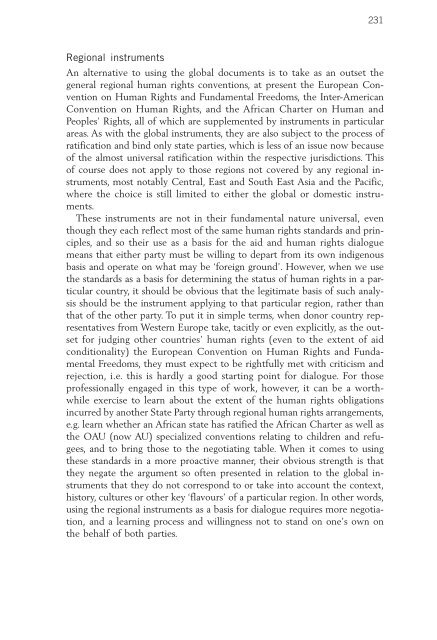Dialogue in Pursuit of Development - Are you looking for one of ...
Dialogue in Pursuit of Development - Are you looking for one of ...
Dialogue in Pursuit of Development - Are you looking for one of ...
Create successful ePaper yourself
Turn your PDF publications into a flip-book with our unique Google optimized e-Paper software.
231<br />
Regional <strong>in</strong>struments<br />
An alternative to us<strong>in</strong>g the global documents is to take as an outset the<br />
general regional human rights conventions, at present the European Convention<br />
on Human Rights and Fundamental Freedoms, the Inter-American<br />
Convention on Human Rights, and the African Charter on Human and<br />
Peoples’ Rights, all <strong>of</strong> which are supplemented by <strong>in</strong>struments <strong>in</strong> particular<br />
areas. As with the global <strong>in</strong>struments, they are also subject to the process <strong>of</strong><br />
ratification and b<strong>in</strong>d only state parties, which is less <strong>of</strong> an issue now because<br />
<strong>of</strong> the almost universal ratification with<strong>in</strong> the respective jurisdictions. This<br />
<strong>of</strong> course does not apply to those regions not covered by any regional <strong>in</strong>struments,<br />
most notably Central, East and South East Asia and the Pacific,<br />
where the choice is still limited to either the global or domestic <strong>in</strong>struments.<br />
These <strong>in</strong>struments are not <strong>in</strong> their fundamental nature universal, even<br />
though they each reflect most <strong>of</strong> the same human rights standards and pr<strong>in</strong>ciples,<br />
and so their use as a basis <strong>for</strong> the aid and human rights dialogue<br />
means that either party must be will<strong>in</strong>g to depart from its own <strong>in</strong>digenous<br />
basis and operate on what may be ‘<strong>for</strong>eign ground’. However, when we use<br />
the standards as a basis <strong>for</strong> determ<strong>in</strong><strong>in</strong>g the status <strong>of</strong> human rights <strong>in</strong> a particular<br />
country, it should be obvious that the legitimate basis <strong>of</strong> such analysis<br />
should be the <strong>in</strong>strument apply<strong>in</strong>g to that particular region, rather than<br />
that <strong>of</strong> the other party. To put it <strong>in</strong> simple terms, when donor country representatives<br />
from Western Europe take, tacitly or even explicitly, as the outset<br />
<strong>for</strong> judg<strong>in</strong>g other countries’ human rights (even to the extent <strong>of</strong> aid<br />
conditionality) the European Convention on Human Rights and Fundamental<br />
Freedoms, they must expect to be rightfully met with criticism and<br />
rejection, i.e. this is hardly a good start<strong>in</strong>g po<strong>in</strong>t <strong>for</strong> dialogue. For those<br />
pr<strong>of</strong>essionally engaged <strong>in</strong> this type <strong>of</strong> work, however, it can be a worthwhile<br />
exercise to learn about the extent <strong>of</strong> the human rights obligations<br />
<strong>in</strong>curred by another State Party through regional human rights arrangements,<br />
e.g. learn whether an African state has ratified the African Charter as well as<br />
the OAU (now AU) specialized conventions relat<strong>in</strong>g to children and refugees,<br />
and to br<strong>in</strong>g those to the negotiat<strong>in</strong>g table. When it comes to us<strong>in</strong>g<br />
these standards <strong>in</strong> a more proactive manner, their obvious strength is that<br />
they negate the argument so <strong>of</strong>ten presented <strong>in</strong> relation to the global <strong>in</strong>struments<br />
that they do not correspond to or take <strong>in</strong>to account the context,<br />
history, cultures or other key ‘flavours’ <strong>of</strong> a particular region. In other words,<br />
us<strong>in</strong>g the regional <strong>in</strong>struments as a basis <strong>for</strong> dialogue requires more negotiation,<br />
and a learn<strong>in</strong>g process and will<strong>in</strong>gness not to stand on <strong>one</strong>’s own on<br />
the behalf <strong>of</strong> both parties.

















![CynefinFramework final [Read-Only]](https://img.yumpu.com/19017304/1/190x135/cynefinframework-final-read-only.jpg?quality=85)